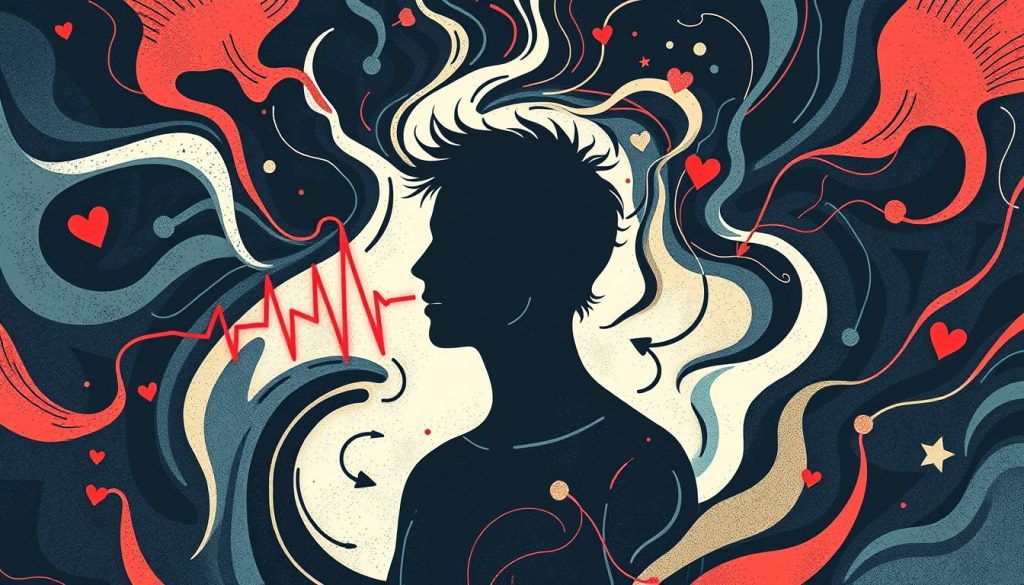When fear and discomfort hit you suddenly, finding panic attack relief and coping with panic attacks is key. This article aims to explain panic attacks, a scary experience that can happen anytime. It disrupts your daily life and well-being.
It’s important to know the signs of a panic attack. Recognizing them is the first step to finding peace again.
We’ll share practical tips on panic attack treatment. These tips can help you feel better during these intense moments. Many people face these sudden panic attacks. But, with the right help, you can find relief.
Start this journey to understand and control panic attacks. Learning how to manage them can greatly improve your life.
In the following sections, we’ll explore panic attacks in detail. We’ll look at their symptoms, the difference between panic and anxiety attacks, and the effectiveness of treatments. Read on to learn how to take back control of your life.
Defining a Panic Attack and Its Prevalence
A panic attack is a sudden rush of intense anxiety and fear. Your heart races and you can’t catch your breath. You might feel dizzy, sick to your stomach, or even like you’re dying.
Left untreated, panic attacks can turn into panic disorder and other issues. They can make you shy away from everyday activities. But, panic attacks can be treated, and early help can make a big difference. With the right treatment, you can manage your symptoms, regain your freedom, and take control of your life again.
“Panic attack” refers to panic attack symptoms like a fast heartbeat, sweating, and trembling. You might also feel like you can’t breathe or like doom is near. These symptoms are more intense than regular anxiety. Spotting these signs early is key to getting the right help.
Panic attacks are a big part of panic disorder but can also show up with other mental or health issues. Knowing how common panic attacks are helps us understand them better. Research shows many people will have at least one panic attack in their life, showing it’s a common issue.
| Age Group | Percentage Reporting Panic Episodes |
|---|---|
| 18-29 | 21.6% |
| 30-44 | 15.0% |
| 45-59 | 10.4% |
| 60+ | 6.8% |
These numbers show how panic disorder affects different age groups. It’s important to educate everyone and offer help to manage panic disorder. Social stigma and not knowing enough about it often stop people from getting help. But, with the right care, people can live better lives.
Healthcare providers and communities are working hard to improve mental health services. Understanding panic attacks—what they are and how common they are—is key to helping people.
Recognizing the Signs of a Panic Attack
Knowing the signs of a panic attack is key to handling it well. We’ll look at both physical and emotional signs that people often see during a panic attack.
Physical Symptoms of Panic Attacks
Physical signs are usually the first clue that a panic attack is starting. Spotting these signs early can help:
- Accelerated heart rate: This feels like your heart is racing or pounding.
- Sweating: You might sweat a lot, even when you’re not hot.
- Trembling or shaking: You might shake without control because of the anxiety.
- Shortness of breath or tightness in your chest: These can feel like a heart attack, making things worse.
- Nausea or abdominal distress: You might feel sick to your stomach or have stomach cramps.
Emotional Responses During a Panic Episode
Emotional and mental signs are just as important as physical ones. Here are some emotional signs to watch for:
- Overwhelming fear or dread: You might feel a sudden, intense fear of something bad happening, even if there’s no danger.
- Feeling detached from reality: You might feel like you’re not really there or that things aren’t real, known as derealization or depersonalization.
- Fear of dying: The panic can make you really scared of dying.
Here’s a table comparing these two types of symptoms:
| Symptom Type | Examples |
|---|---|
| Physical Symptoms | Heart palpitations, Sweating, Trembling, Shortness of breath, Nausea |
| Emotional Symptoms | Intense fear, Feeling detached, Fear of dying |

Distinguishing Between Panic Attacks and Anxiety Attacks
It’s important to know the difference between a panic attack vs anxiety attack. Both can have similar symptoms, but they have key differences. These include triggers, how long they last, and how intense they are.
A panic attack is sudden and intense fear or discomfort. It peaks in minutes. Symptoms include fast heart rate, sweating, shaking, feeling like you can’t breathe, and feeling like you’re going to die.
These attacks can happen without warning. They are not caused by specific stressors, making them unpredictable and scary.
An anxiety attack starts slowly because of a stressor or threat. It’s less intense but lasts longer. Symptoms like worry, distress, and tension grow over time. They are overwhelming but don’t reach the peak of panic attacks.
| Feature | Panic Attack | Anxiety Attack |
|---|---|---|
| Onset | Sudden | Gradual |
| Duration | Minutes | Hours to Days |
| Intensity | Severe | Moderate to Severe |
| Triggers | Often unprovoked | Specific stressors |
To learn more about symptoms and how to manage these conditions, check out this resource. It can help you understand related health issues better.
It’s critical to know if someone is having a panic attack or an anxiety attack. This knowledge helps in providing the right support and treatment. While both are treated with therapy and medication, the approach can vary. This shows why it’s important to tell them apart.
Common Triggers of Panic Attacks
Figuring out panic attack triggers is key to coping with panic attacks. Knowing what causes these intense episodes helps people manage their reactions better. We’ll look at common triggers, focusing on environmental factors and personal traumas.
Environmental Factors that Provoke Panic
Many environmental conditions can trigger panic attacks. These are often places or situations that make us feel helpless or overwhelmed. Examples include crowded areas, small spaces, or loud noises. These can make someone’s anxiety spike, leading to panic, if they’re already anxious.
Personal Traumas and Panic Attack Likelihood
Our past experiences greatly affect our chances of having panic attacks. Events like past abuse, big losses, or traumatic incidents can be strong triggers. These events can bring up intense emotions suddenly, often because of reminders or subconscious links. Knowing these personal triggers is key to dealing with panic attacks.
In the table below, we compare environmental and trauma-related triggers. This helps us understand their impact and how common they are.
| Type of Trigger | Examples | Commonality |
|---|---|---|
| Environmental | Crowded spaces, confined areas, loud noises | High |
| Personal Trauma | Past abuse, significant loss, traumatic events | Varies |

Understanding Panic Disorder and its Diagnosis
Panic disorder is more than just a few panic attacks. It’s about having many attacks that make you fear more will happen. This fear can really get in the way of your daily life, making it hard to enjoy things. That’s why finding good panic attack treatment is so important.
Doctors figure out if you have panic disorder by checking your symptoms against certain rules. They might talk to you about your feelings and thoughts. They might also do a physical check to make sure it’s not something else.
| Clinical Criteria | Description |
|---|---|
| Recurrent Panic Attacks | Multiple unexpected panic attacks characterized by intense fear and discomfort. |
| Persistent Concern | Ongoing worry about the implications or consequences of the attacks, such as losing control or having a severe medical issue. |
| Behavior Adjustments | Significant changes in behavior related to the attacks, generally to avoid situations that are believed to trigger panic. |
Dealing with panic disorder means you might try therapy, medicine, or change your lifestyle. Getting help from experts early on can really help. It can make you stronger against future attacks.
Managing panic disorder is tough, but it’s not impossible. With the right help and ways to cope, you can take back control. You can live a happy life, even with this challenge.
Immediate Relief: Managing a Panic Attack in Progress
When a panic attack hits, you need quick and effective ways to feel better. Knowing how to handle the symptoms can help you calm down and regain control. Learning practical techniques is key to managing panic attacks well.
Breathing Techniques to Alleviate Panic
Focused breathing is a powerful tool against panic attack symptoms. By controlling your breath, you can lessen the panic and relax.
- Deep Breathing: Breathe in slowly through your nose, hold for four counts, and then breathe out slowly through your mouth. Keep doing this until the panic goes away.
- Counted Breathing: Breathe in for five counts, then breathe out for the same time. This distracts you from the panic and stabilizes your feelings.
Grounding Practices for Regaining Control
Grounding techniques can pull you out of panic and back to the present. They are vital for managing panic attacks.
- 5-4-3-2-1 Technique: Notice five things you see, four things you can touch, three sounds you hear, two smells you can identify, and one thing you can taste. This shifts your focus away from panic.
- Physical Grounding: Touch different objects around you. Feel their texture, temperature, and weight. This physical activity helps your mind move away from panic.
Long-Term Panic Attack Treatment Options
Managing panic disorders often needs a mix of psychotherapy and medication. The right treatment depends on each person’s needs. This ensures those with panic attacks can find lasting relief through various options.
Psychotherapy Methods for Panic Disorder
Cognitive-behavioral therapy (CBT) is key in treating anxiety attacks. It helps change negative thoughts that lead to panic. CBT teaches coping strategies to lessen attack severity and frequency.
Exposure therapy is also helpful. It involves slowly facing the source of anxiety in a safe setting. This helps manage panic over time.
Medications That Can Help With Panic Episodes
SSRIs are often used to treat anxiety attacks. They help stabilize mood and reduce anxiety symptoms. Benzodiazepines might be used for short-term panic relief but are avoided long-term due to dependence risks.
Finding the right mix of therapy and medication is vital. Everyone’s fight against anxiety and panic is different. What works for one might not work for another. Regular talks with healthcare professionals are key to finding the best treatment plan.
Developing a Support System for Managing Panic Attacks
Creating a strong support network is key to handling panic attacks well. This part looks at why having family, friends, and support groups is important. It helps in recovery and keeps you supported with panic attack support.
Having a supportive community is very important when dealing with panic attacks. They offer emotional support and practical tips. Both are essential for managing panic attacks over time.
- Understanding: Friends and family who know what to look for can help during an attack.
- Safety: A trusted person can go with you to new places or events that might cause anxiety.
- Regular Check-ins: Talking regularly can make you feel less alone and more reassured.
Also, finding professionals who can help with managing panic attacks is a big part of your network.
- Therapists who focus on anxiety disorders.
- Support groups where you can share and learn from others.
Building such a support system is not just helpful. It’s a vital part of your plan to deal with panic attacks. A good support system helps not just during attacks but also in living a healthier life.
Panic Attack: Unpacking the Misconceptions
In our quest for understanding panic attacks, we must tackle common myths about panic attacks. These myths spread stigma and misinformation. They make it hard to understand these intense episodes. By debunking these myths, we can create a more informed and caring environment for those affected.
Many think panic attacks are just stress or anxiety. But they are sudden, intense episodes of anxiety. They include physical symptoms like heart palpitations, sweating, and dizziness. These symptoms can be very scary.
It’s also a myth that panic attacks can make you faint. Panic attacks usually raise blood pressure, not lower it. This shows why accurate health education is key to understanding the condition.
- Panic attacks are a sign of emotional weakness.
- Panic attacks can make you lose control and go insane.
- You can always avoid triggers of panic attacks.
These myths make the experience seem less serious. They also stop people from seeking help. It’s vital to treat panic attacks with the seriousness they deserve.
Myths about panic attacks can hurt relationships, careers, and life quality. Friends, family, and employers may not understand the condition without the right information. By clearing up these myths, we support mental wellness for everyone. This helps create a more caring society.
Impact of Diet and Lifestyle on Panic Attacks
Our daily habits have a big impact on our mental health, like how diet and lifestyle affect panic attacks. This part talks about how certain foods and habits can change how often and how bad panic attacks are.
Nutritional Considerations for Panic Attack Prone Individuals
Eating right is key to managing anxiety and panic. Avoiding too much caffeine and sugar is a good start. These can make panic attacks worse. Eating foods high in magnesium, like greens and nuts, can help calm your nerves.
Lifestyle Adjustments to Reduce Panic Episodes
Changing your lifestyle can help fight panic attacks. Getting enough sleep, exercising regularly, and using stress-relief methods like mindfulness or yoga can really help. These changes can make your mind feel more balanced.

| Nutrient | Benefits | Sources |
|---|---|---|
| Magnesium | Calms nerves, reduces anxiety | Spinach, pumpkin seeds, yogurt |
| Omega-3 Fatty Acids | Decreases inflammation, supports brain health | Salmon, flaxseeds, walnuts |
| B Vitamins | Improves mood, reduces fatigue | Chicken, eggs, bananas |
| Zinc | Regulates neurotransmitter function, reduces anxiety | Beef, cashews, chickpeas |
Mindfulness and Relaxation Techniques for Anxiety
In today’s fast-paced world, mindfulness for panic attack and relaxation techniques are lifesavers. They help us find peace in our minds and bodies. These tools are great for lowering stress and boosting our well-being.
Mindfulness means being fully in the moment, without distractions. It helps us deal with panic attacks by keeping our minds grounded. This practice is key for those fighting anxiety.
- Meditation: It teaches us to stay present. This skill is essential for calming our minds.
- Deep Breathing Exercises: They quickly reduce panic by slowing our heart rate and calming us down.
- Progressive Muscle Relaxation (PMR): PMR relaxes our muscles by tensing and then relaxing them. It improves our body awareness and relaxation.
Adding these relaxation techniques to our daily lives can greatly improve our quality of life. They help lessen anxiety and panic attacks. Let’s see how each method works well.
| Technique | Description | Benefits |
|---|---|---|
| Meditation | Focus on breath or a mantra to foster full concentration. | Reduces stress, enhances emotional health. |
| Deep Breathing Exercises | Controlled inhales and exhales to regulate the nervous system. | Decreases anxiety, improves heart rate variability. |
| Progressive Muscle Relaxation | Sequential tensing and relaxing of muscle groups. | Improves sleep quality, reduces symptoms of stress. |
For those interested in mindfulness for panic attack, starting with short daily sessions can make a big difference. These practices calm our bodies and greatly benefit our emotional and mental health.
Role of Exercise in Managing Symptoms of Panic
Regular exercise is key in managing panic symptoms. It offers big benefits for both body and mind. Adding physical activities to your daily life can lessen panic attacks. This makes it a natural and effective way to handle panic symptoms.
The Benefits of Regular Physical Activity
Regular exercise boosts heart health and mood. It also releases endorphins, which make us feel better. Studies show that exercise can lower tension, improve mood, and help sleep better. Even just five minutes of aerobic exercise can help calm anxiety.
Recommended Types of Exercise for Anxiety and Panic
- Aerobic exercises, like brisk walking or swimming, improve fitness and mood. They also boost endorphins.
- Yoga and Tai Chi focus on deep breathing and mindfulness. They help manage panic by promoting relaxation.
- Strength training, done right, builds confidence. It reduces anxiety by releasing stress-reducing hormones.

Integrative Therapies: Combining Conventional and Alternative Approaches
In mental health, mixing traditional treatments with new methods can really help. Integrative therapies for panic are becoming more popular. They offer a complete way to tackle panic disorders.
The beauty of integrative therapies for panic is how they focus on the whole person. They use traditional medicine and alternative panic attack treatment like acupuncture, yoga, or herbs. Experts guide these choices. Here are some key therapies in this mix:
- Acupuncture: It helps reduce stress and anxiety that can lead to panic attacks.
- Mindfulness and Meditation: These help you handle stress better and feel calmer.
- Herbal Supplements: Herbs like lavender or chamomile can calm the nervous system.
By mixing these treatments, patients can better manage their symptoms. They also learn how to avoid future panic attacks. This way, alternative panic attack treatment fits each person’s needs. Finding the right mix can change lives for the better.
For those interested in integrative therapies for panic, it’s key to talk to doctors who know both traditional and alternative medicine. This ensures treatments work well together for the best recovery.
Myths and Facts About Panic Attacks
Understanding panic attacks means we must clear up myths about panic attacks and stick to panic attack facts. This way, we can fight off wrong ideas and get a true view of what panic attacks are.
Debunking Common Panic Attack Myths
- Myth: Panic attacks can cause fainting.
- Fact: Despite intense fear and symptoms, fainting is rare in panic attacks due to increased heart rate keeping blood flow to the brain steady.
- Myth: Only weak-minded individuals suffer from panic attacks.
- Fact: Panic attacks are a psychological issue that can affect anyone, irrespective of mental strength.
- Myth: Panic attacks last for a very long time.
- Fact: They typically last from several minutes to an hour, peaking in the first 10 minutes.
Understanding the Realities of Panic Symptoms
Knowing the real symptoms of panic attacks helps in managing them better and understanding those who go through them. Here are some key panic attack facts:
- Intense palpitations or accelerated heart rate.
- Sweating, trembling, and feelings of breathlessness.
- An overwhelming fear of disaster or losing control when there is no real danger.
By correcting these myths about panic attacks, we help those who experience them and build a more informed and supportive community.
| Myth | Reality |
|---|---|
| Panic attacks are always triggered by stress. | They can occur unexpectedly, even during relaxation or sleep. |
| Panic attacks are dangerous and harmful to the body. | While deeply uncomfortable, they are not physically harmful. |
| Panic attacks will lead to losing control and insanity. | Panic attacks are a symptom of anxiety, not a loss of sanity or control. |
When to Seek Professional Help for Panic Disorders
Knowing when to get professional help for panic disorder is key to managing it well. Many people don’t see how serious it is until it really gets in the way of their life. Signs you might need help include having a lot of panic attacks and being really scared of them.
Seeing a doctor who specializes in anxiety attack treatment can really help. They can teach you ways to deal with panic attacks better. Here are some times when you should think about getting help from experts.
- Attacks that happen a lot and mess up your daily plans
- Being really scared or worried about having an attack and avoiding things because of it
- Having symptoms that don’t go away even when you’re not having an attack
- Being unable to do things at work, with friends, or at home because of anxiety
| Condition | Recommended Professional |
|---|---|
| Mild Frequency Panic Attacks | Counselors or Psychologists |
| Severe Panic Attacks | Psychiatrists or Psychopharmacologists |
| Panic Attacks with Depression | Psychiatrists or Clinical Psychologists |
| Panic Disorder in Teens | Child and Adolescent Psychiatrists |
Finding the right anxiety attack treatment and professional help for panic disorder means knowing about different mental health experts. Counselors and psychologists help with changing behaviors. Psychiatrists might give medicines for really bad symptoms. Talk to a general doctor to find the best help for you.
If panic attacks are really hurting your life, don’t wait to get help. Getting help early is important for controlling symptoms and feeling better. Remember, asking for help is a step towards getting your life back on track.
Coping Strategies: Building Resilience Against Future Attacks
Starting a journey to deal with panic attacks shows a strong commitment to health and mental well-being. Building resilience against future attacks is a complex process. It greatly benefits from a plan that fits each person’s needs.
Using various techniques, like grounding and changing what you eat, can help a lot. Creating a detailed plan that includes these methods is a big step. It helps keep a balanced life, even when panic attacks come unexpectedly.
Practicing mindfulness and relaxation is key to building resilience. Activities like meditation or progressive muscle relaxation help. They make you feel calm and better at handling stress, which is important for dealing with panic attacks.
Also, having a strong support system is vital. This can be friends, support groups, or mental health professionals. They offer encouragement and new views. It’s not just about getting through panic attacks. It’s also about building a strong base of peace and support.
Adding regular exercise and good sleep habits also helps. These lifestyle choices, along with professional help when needed, create a strong defense against panic attacks. Whether it’s therapy or medication, the goal is to create a plan that works for you.
Building resilience is not just about getting ready for the next panic attack. It’s about changing your life to build strength, confidence, and peace. It’s about taking control and feeling secure.
FAQ
Q: What exactly is a panic attack and how do I recognize it?
A: A panic attack is a sudden, intense fear or discomfort. It can happen without a clear reason. You might feel your heart racing, sweat, tremble, or have trouble breathing. You might also feel like you’re losing control or that something terrible is about to happen.
Q: Are panic attacks common and who experiences them?
A: Panic attacks can happen to anyone, at any age. They are a key symptom of panic disorder. This anxiety disorder affects about 2-3% of American adults each year.
Q: How is a panic attack different from an anxiety attack?
A: Panic attacks are sudden and very intense. They cause physical reactions and can happen without warning. Anxiety attacks, on the other hand, are often about worrying about something stressful. They are less intense and last longer.
Q: What are common triggers that seem to provoke panic attacks?
A: Stress, big changes, and traumatic events can trigger panic attacks. So can medical issues, caffeine, and certain substances. Being in crowded places or facing specific fears can also trigger them.
Q: How is panic disorder diagnosed?
A: A healthcare professional will diagnose panic disorder. They look at your history, do physical exams, and assess your mental state. They check how often and how intense your panic attacks are.
Q: What breathing techniques can help during a panic attack?
A: Deep, controlled breathing can help slow your heart and relax you. Try inhaling slowly through your nose, holding it for a few seconds, and then exhaling through your mouth.
Q: Can psychotherapy effectively treat panic disorder?
A: Yes, psychotherapy, like cognitive-behavioral therapy (CBT), is very effective. It helps you understand your attacks, learn coping strategies, and face your fears gradually.
Q: What role does a support system play in managing panic attacks?
A: A strong support system is vital. They offer emotional support, understanding, and encouragement. Friends, family, therapists, and support groups can all help during attacks and throughout treatment.
Q: What lifestyle adjustments can contribute to reduced panic episodes?
A: Adjusting your lifestyle can help reduce panic episodes. Keep a regular sleep schedule, exercise regularly, and avoid caffeine and alcohol. Practice stress management and avoid nicotine and drugs.
Q: How can mindfulness and relaxation techniques improve panic disorder symptoms?
A: Mindfulness and relaxation techniques can help. They focus on the present, reduce stress, and calm you down. Meditation, progressive muscle relaxation, and deep breathing are good options.
Q: What are the advantages of regular exercise for those with anxiety and panic?
A: Regular exercise is beneficial for anxiety and panic. It releases endorphins, improves sleep, and reduces stress. It also boosts your mood and helps with anxiety and depression.
Q: Are integrative therapies beneficial in managing panic attacks?
A: Integrative therapies can be helpful. They combine traditional treatments with alternative methods like acupuncture and herbal supplements. Just make sure to use them under professional guidance as part of a complete treatment plan.
Q: What should I do if my panic attacks severely disrupt my life?
A: If panic attacks are really affecting your life, seek help from a healthcare provider. They can offer treatments and create a plan to manage your panic episodes.
Q: How can I build resilience to reduce the impact of future panic attacks?
A: To build resilience, use coping strategies like relaxation techniques and a healthy lifestyle. Seek support and consider therapy. Being proactive and having a self-care plan is key.


















